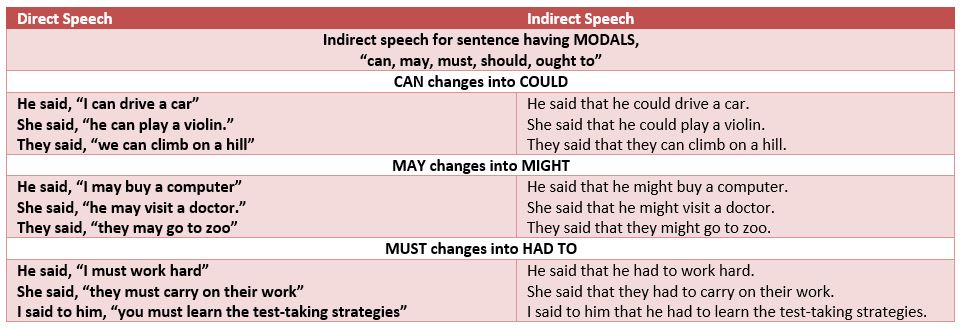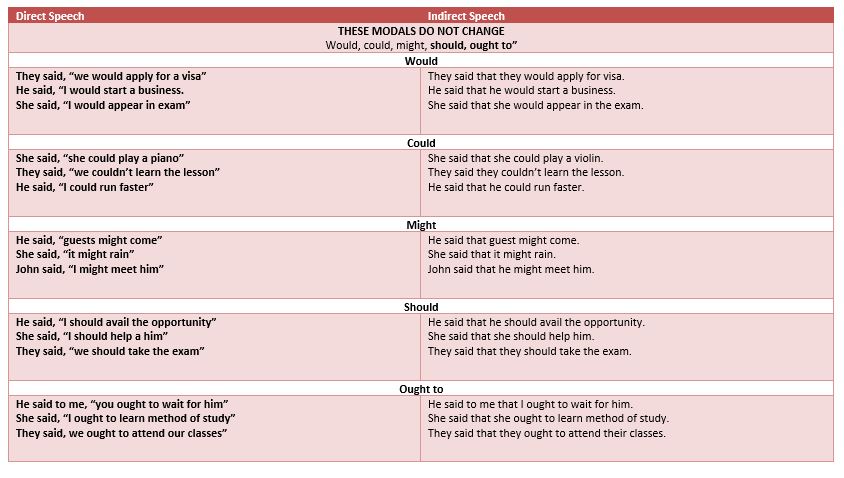Speech and Its types
Speech in English grammar is used to narrate the spoken words of a person. There are two ways of narration
- Direct Speech
When we report the words exactly as they are spoken. The actual words of the speaker are quoted without any change. - Indirect Speech
When the words are narrated in our own words. As the words had been spoken in the past tense and to report the spoken words in the present tense, tense needs to be changed and so are the pronouns.
Example:
Direct Speech: Sandy said to his father, “I need more money”.
Indirect Speech: Sandy told his father that he needed more money.
- The exact words of the speaker which are put within inverted commas are called the Reported Speech.
- The verb that introduces the Reported speech is called Reporting Verb. In the above example “said” is the reporting verb and “I need more money” is the reported speech.
Important Points:
- Direct speech is always enclosed within inverted commas and it always begins with a capital letter. It is separated from the Reporting verb by a comma.
- In the Indirect Speech, no inverted commas are used and no comma is used to separate the Reporting Verb from the Reported Speech.
Tense Rules while converting Direct Speech into Indirect Speech
| Tense of Direct Speech Sentence | Helping Verb of Direct Speech Tense | Tense of Indirect Speech sentence (After conversion) | Helping Verb of Indirect Speech Tense (After Conversion) | |
| Present | Present Simple | Do/Does | Past Simple | Did |
| Present Continuous | Is/Am/Are | Past Continuous | Was/Were | |
| Present Perfect | Has/Have | Past Perfect | Had | |
| Past | Past Simple | Did | Past Perfect | Had |
| Past Continuous | Was/Were | Past Perfect Continuous | Had Been | |
| Past Perfect | had | Past Perfect | Had | |
| Future | Future Simple | Will | Present Conditional | Would |
| Future Continuous | Will be | Conditional Continuous | Would be | |
| Future Perfect | Will have | - | Would have | |
| Future Perfect Continuous | Will have been | - | Would have been | |
Direct to Indirect Speech Conversion: Universal truth or a habitual fact
a) If the Reported Speech expresses a universal truth or a habitual fact, its tense remains unchanged.
Examples:
- The teacher said, “The earth revolves round the sun”.
- The teacher said that the earth revolves round the sun.
b) When the Reported Speech contains a time clause and both the main verb and the verb in the time clause is the simple past, these verbs are left unchanged.
Example:
- He said, “The boy stuck to his post till his father ordered him to leave”.
- He said that the boy stuck to his post till his father ordered him to leave.
However, if the main verb is in the simple past while the verb in the time clause as in past continuous, it is usual to change the main verb to past perfect and leave the verb in the time clause unchanged:
Example:
- He said, “Asif slipped when he was trying to board a bus”.
- He said that Asif had slipped when he was trying to board a bus.
Direct to Indirect Speech Conversion: Rules for the Change of Pronoun
- First Person:
Pronouns of the first person are changed into pronouns of the same person as the person of the subject of the Reporting Verb:
Example:
(i) I said, “I have done my home work”.
I said the I had done my homework.
(ii) You said, “I have done my home work”.
You said that you had done your home work.
(iii) He said, “I have done my home work”.
He said that he had done his home work.
- Second Person:
Pronouns of the second person are changed into pronouns of the same person as that of
the object of the Reporting Verb:
Example:
(i) The teacher said to me, “You have not done your work well”.
The teacher told me that I had not done my work well.
- Third Person:
Pronouns of the third person generally remain unchanged:
Example:
(i) I said to you, “He should not be trusted”.
I told you that he should not be trusted.
Important: When there are two or more third-persons pronouns in the Indirect Speech, the name of the person referred to by each may be written in brackets against each of them to avoid confusion:
Example:
- The servant said to his master,“I have told you the truth and I can do no more”.
- The servant told his master that he had told him (master) the truth and he (servant) could do no more
One has to be a little careful while changing the Personal Pronoun “we”.
In case of "we" - “we” can be retained as “we” or changed to “you” or “they” depending upon the relationship of the speaker, the person(s) addressed and the person reporting the speech:
Example:
(i) He said to me, “We should have tried harder”.
He told me that we should have tried harder.
(ii) He said to you, “We should have tried harder”.
He told you that you should have tried harder.
Direct to Indirect Speech Conversion: Conversion of Interrogative Sentences
While changing the interrogative sentences into Indirect Speech, the following rules should be observed:
- Change the Reporting Verb into ask, enquire, demand, wonder, want to know, etc.
- Change the Interrogative form into the Assertive form and remove the sign of Interrogative
- No conjunction is used when the sentence begins with question words like who, whose,
- whom, what, which, when, why, where, how, etc.
- Tenses, pronouns and words denoting nearness are changed according to the rules.
Example:
(i) She said to me, “What can I do for you, dear?”
She asked me affectionately what she could do for me.
(ii) The old man said to his son, “What harm have I done to you?”
The old man asked his son what harm he had done to him.
Direct to Indirect Speech Conversion: Conversion of Present Modals into Past Modals

Direct to Indirect Speech Conversion: Direct Speech sentence having MODALS, should, ought to, might, would, and could”
Direct to Indirect Speech Conversion: Other Important changes of terms
Direct to Indirect Speech Conversion: Conversion of Imperative Sentences
While changing the imperative sentences into Indirect Speech, the following rules should be observed:
- The Reporting Verb is changed into a verb signifying a command, request, advice.
- The command can be expressed by the words command, order, tell, charge etc.
- Request can be expressed by the words request, beg, ask, implore, entreat, desire,
- beseech, solicited, etc.
- Besides these words, forbid, persuade, incite, etc. May also be used according to the context.
- The verb of the Reported Speech is changed into an Infinitive.
- If the Reported Speech is negative, the word “not” is placed before the infinitive.
- Tenses, pronouns, and words denoting nearness are changed according to the rules.
Examples:
(i) He said to me, “Help him in setting the accounts”.
He requested me to help him in setting the accounts.
(ii) My friend said to me, “Please accept this invitation”.
My friend entreated me to accept that invitation.
(iii) The Doctor said to the patient, “Give up smoking”.
The Doctor advised the patient to give up smoking.
(iv) The Commander said to his men, “March further”.
The Commander urged his men to march further.
Direct to Indirect Speech Conversion: Conversion of Imperative Sentences with “Let”
“Let” is often used to make proposals in such cases, he said, “ Let us do it” is changed to they suggested / proposed doing it or he suggested / proposed that they should do it.
Example:
- I said to my brother, “Let us go to some hill station for a change”
I suggested to my brother that we should go to some hill station for a change. - “Let us invite some friends to our son’s birthday”, said the father.
The father proposed that they should invite some friends to their son’s birthday.
Direct to Indirect Speech Conversion: Conversion of Exclamatory and Optative Sentences
While converting exclamatory and Optative Sentences from Direct to Indirect Speech the following general rules have to be observed:
Rules 1
- In the case of exclamatory sentences the Reporting Verb is changed to exclaim with sorrow/Joy/fear/anger, etc., applaud, regret, curse, coy out or any other such verb that properly conveys the tone of exclamation.
Rules 2
- The Conjunction “that” is used to introduce the Reported Speech
Rules 3
- The Exclamatory sentence is changed into an assertive one before it is put
into Indirect Speech.
Rules 4
- Interjections and exclamations are omitted and their sense conveyed by means of adverbs
or adverbial phrases.
Rules 5
- Tenses, pronouns, and words showing nearness are changed according to the rules already stated.
Example:
- “What a horrible sight!” we all exclaimed. (Direct Speech)
We all exclaimed that it was a very horrible sight. (Indirect Speech) - “Alas! I have broken my brother’s watch” said he. (Direct Speech)
He exclaimed sorrowfully that he had broken his brother's watch. (Indirect Speech) - “How beautiful she is!” said Boon. (Direct Speech)
Boon exclaimed joyfully that she was very beautiful. (Indirect Speech) - He said, “Just my luck! I never thought I would fail this time too” (Direct Speech)
He exclaimed that he was, as usual, unlucky and added that he had never thought he would fail that time too. (Indirect Speech)
 Get SSC Exams Important Updates, Study Notes, Free PDF & more, Join BYJU'S Exam Prep SSC Telegram Group Join Now
Get SSC Exams Important Updates, Study Notes, Free PDF & more, Join BYJU'S Exam Prep SSC Telegram Group Join Now Stay tuned for more updates!
All The Best
DREAM, STRIVE & SUCCEED With US!

3 Crore+ Registered Aspirants | 2.5 Crore Downloads | 50,000+ Selections







Comments
write a comment